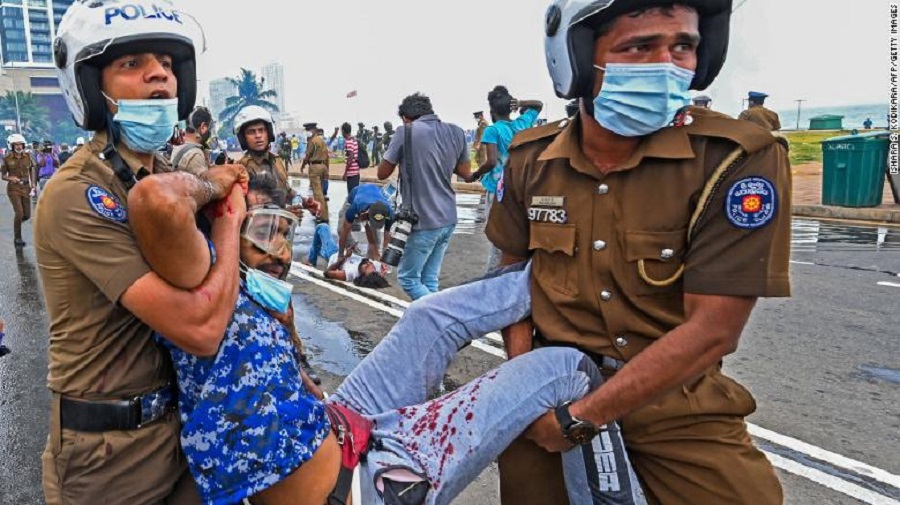
Policemen remove an injured man from Monday's protests.
Sri Lanka's Prime Minister, Mahinda Rajapaksa, resigned on Monday, following weeks of protests against his government.
The country has been rocked by civil unrest since March, with demonstrations at times turning violent as anger builds over the government's apparent mishandling of Sri Lanka's worst economic crisis since declaring independence from Britain in 1948.
A nationwide curfew was imposed after clashes broke out between supporters of the ruling party and anti-government demonstrators in the capital city, Colombo, the police said Monday. The restrictions were announced shortly before Rajapaksa announced his resignation.
Anti-government protesters attacked buses carrying local officials who traveled to Colombo on Monday morning to attend a meeting with the Prime Minister, according to the national police.
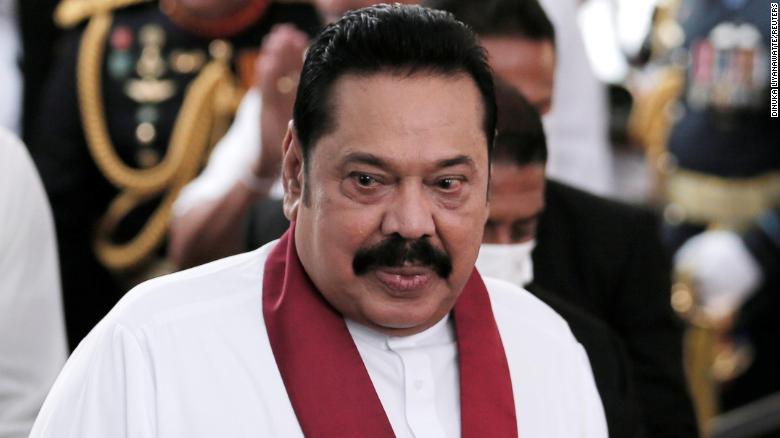
Mahinda Rajapaksa pictured at his swearing in ceremony as prime minister in August 2020.
At least 151 people were admitted to the hospital following violence at the protests, Colombo National Hospital said. Armed troops have been deployed in Colombo, according to CNN's team on the ground.
Rajapaksa's office released a statement announcing the 76-year-old veteran politician's resignation, reported Reuters.
"A few moments ago, Prime Minister Mahinda Rajapaksa sent his letter of resignation to President Gotabaya Rajapaksa," the statement said.
In the letter, a copy of which was seen by Reuters, the prime minister said he was quitting to help form an interim, unity government.
"Multiple stakeholders have indicated the best solution to the present crisis is the formation of an interim all-party government," the letter said.
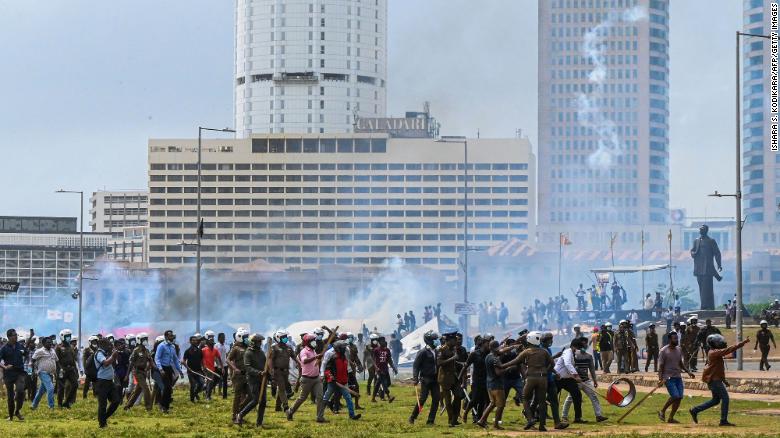
Pro- and anti-government groups clashing on Monday.
"Therefore, I have tendered my resignation so the next steps can be taken in accordance with the Constitution."
His departure came during a day of chaos and violence which culminated in police imposing the curfew across the country.
The confrontation began with hundreds of ruling party supporters rallying outside the prime minister's official residence before marching to an anti-government protest site outside the presidential office.
Police had formed a line ahead of time on the main road leading towards the site but did little to stop pro-government protesters from advancing, according to a Reuters witness.
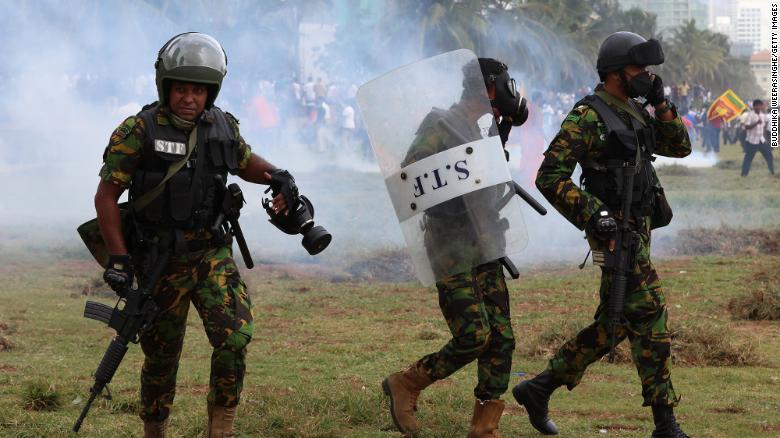
Special Task Force (STF) riot police pictured on Monday.
Pro-government supporters, some armed with iron bars, attacked anti-government demonstrators at the "Gota Go Gama" tent village that sprang up last month and became the focal point of nationwide protests.
Police used tear gas rounds and water cannon to break up the confrontation, the first major clash between pro-and anti-government supporters since the protests began in late March.
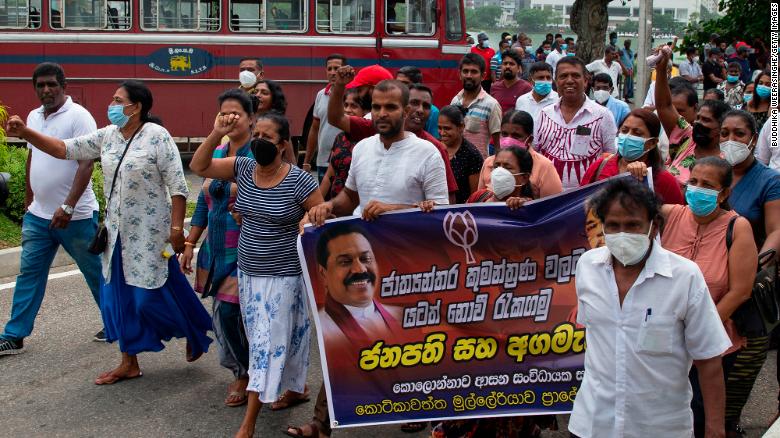
Government supporters marching on Monday.
"This is a peaceful protest," Pasindu Senanayaka, an anti-government protestor told Reuters. "They attacked Gota Go Gama and set fire to our tents."
"We are helpless now, we are begging for help," Senanayaka said, as black smoke spiraled out of a burning tent nearby and parts of the protest camp lay in disarray.
Dozens of paramilitary troops with riot shields and helmets were deployed to keep both groups apart after the initial clashes. The army said it had also deployed soldiers in the area.
"Strongly condemn the violent acts taking place by those inciting & participating, irrespective of political allegiances," President Rajapaksa said in a tweet. "Violence won't solve the current problems."
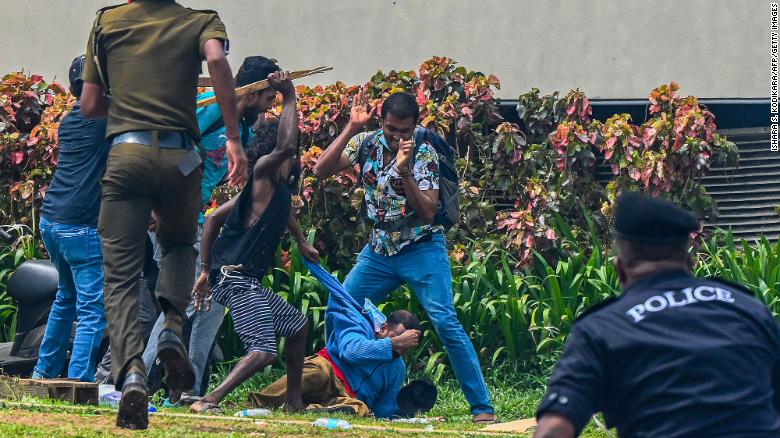
Clashes took place outside the prime minister's official residence.
Hit hard by the pandemic, rising oil prices and tax cuts, Sri Lanka has as little as $50 million of useable foreign reserves, finance minister Ali Sabry said last week.
The government has approached the International Monetary Fund (IMF) for a bailout, and will begin a virtual summit on Monday with IMF officials aimed at securing emergency assistance.
Facing escalating anti-government protests, Rajapaksa's government last week declared a state of emergency for the second time in five weeks, but public discontent has steadily simmered.
Long lines for cooking gas in recent days have frequently turned into impromptu protests as frustrated consumers blocked roads. Domestic energy companies said they were running low on stocks of liquid petroleum gas mainly used for cooking.
Sri Lanka needs at least 40,000 tonnes of gas each month, and the monthly import bill would be $40 million at current prices.
"We are a bankrupt nation," said W.H.K Wegapitiya, chairman of Laugfs Gas, one of the country's two main gas suppliers.
"Banks don't have sufficient dollars for us to open lines of credit and we cannot go to the black market. We are struggling to keep our businesses afloat."





